Paul grew up in a supportive family environment. His father, a cotton salesman, had led a band in the 1920s and taught Paul to play jazz standards on the piano. He took trumpet lessons as a child and after hearing Lonnie Donegan play in 1956, began to teach himself guitar. As a left handed guitar player, Paul's fate was sealed. His guitar, restrung upside down, became a consuming passion. The same year, his mother died of cancer, leaving him learn hard lessons in discipline and self-reliance.
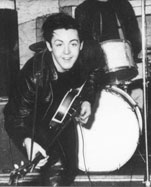 Paul's neutral public stance, disguised by a private inner resolve, became a keystone to the Beatles' internal politics. Unlike George, he was not a natural trouble maker. He was agreeable to mischievous activities though and adapted to the others' personalities. With John, he shared the loss of his mother. With George, he shared a commitment to the technical aspects of musical excellence. After Stuart Sutcliffe left the group in 1961, it was Paul who gave up his instruments, guitar and piano, for the bass when nobody else would do so. He went on to become one of the most influential and inventive players of the instrument.
Paul's neutral public stance, disguised by a private inner resolve, became a keystone to the Beatles' internal politics. Unlike George, he was not a natural trouble maker. He was agreeable to mischievous activities though and adapted to the others' personalities. With John, he shared the loss of his mother. With George, he shared a commitment to the technical aspects of musical excellence. After Stuart Sutcliffe left the group in 1961, it was Paul who gave up his instruments, guitar and piano, for the bass when nobody else would do so. He went on to become one of the most influential and inventive players of the instrument.
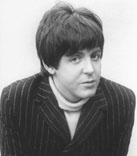 Although John was the acknowledged leader of the Beatles, Paul took the reins and led the group into such projects as Sgt. Pepper's Lonely Hearts Club Band (widely hailed as their most influential album) and after Brian Epstein's death in 1967, the Magical Mystery Tour film and soundtrack and the Let It Be album and documentary film. As he took on more responsibilities for the band's productivity and as the others lapsed into indifference born of having conquered the world several times over, Paul's leadership became increasingly burdensome. In particular, the others resented his tendency to dictate musical arrangements to the note, as well as his enthusiasm for seemingly inconsequential ditties such as "Ob-La-Di, Ob-La-Da" and "Maxwell's Silver Hammer".
Although John was the acknowledged leader of the Beatles, Paul took the reins and led the group into such projects as Sgt. Pepper's Lonely Hearts Club Band (widely hailed as their most influential album) and after Brian Epstein's death in 1967, the Magical Mystery Tour film and soundtrack and the Let It Be album and documentary film. As he took on more responsibilities for the band's productivity and as the others lapsed into indifference born of having conquered the world several times over, Paul's leadership became increasingly burdensome. In particular, the others resented his tendency to dictate musical arrangements to the note, as well as his enthusiasm for seemingly inconsequential ditties such as "Ob-La-Di, Ob-La-Da" and "Maxwell's Silver Hammer".
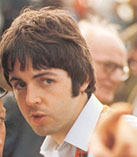 It is clear that for Paul - unlike John and George - being a Beatle was enough. He had thrived on the extroversion, publicity and adulation of the mid-1960s and came to miss those things as the others insulated themselves from the excesses of Beatlemania. His efforts to revive the spirit of the group in 1969, which included plans for a tour, a television special and a feature film, ultimatley solidified the Fabs' differences.
It is clear that for Paul - unlike John and George - being a Beatle was enough. He had thrived on the extroversion, publicity and adulation of the mid-1960s and came to miss those things as the others insulated themselves from the excesses of Beatlemania. His efforts to revive the spirit of the group in 1969, which included plans for a tour, a television special and a feature film, ultimatley solidified the Fabs' differences.
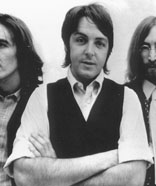 Although Paul had tried the hardest to keep the band together, it was also he who took the most decisive step towards dissolution. In 1970, rather than accept the others' decision to hand over control of their careers to Allen Klein, he initiated court action to dissolve their partnership.
Although Paul had tried the hardest to keep the band together, it was also he who took the most decisive step towards dissolution. In 1970, rather than accept the others' decision to hand over control of their careers to Allen Klein, he initiated court action to dissolve their partnership.
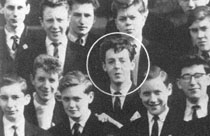 JAMES PAUL McCARTNEY
JAMES PAUL McCARTNEY